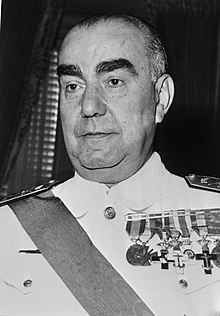
Back Assassinat de Carrero Blanco Catalan Asesinato de Carrero Blanco Spanish Ogro operazioa Basque Assassinat de Luis Carrero Blanco French Asasinato de Carrero Blanco Galician Luis Carrero Blanco meggyilkolása Hungarian Uccisione di Luis Carrero Blanco Italian Operazion Ogro LMO Attentatet mot Luis Carrero Blanco NB
This article needs additional citations for verification. (March 2014) |
| Assassination of Luis Carrero Blanco | |
|---|---|
| Part of the Basque conflict | |
 Luis Carrero Blanco | |
 | |
| Location | Madrid, Spain |
| Date | 20 December 1973 9:36 a.m. (CST) |
| Target | Luis Carrero Blanco |
Attack type | Underground mine |
| Deaths | 3 |
| Perpetrators | ETA |
| Part of a series on |
| Francoism |
|---|
 |
On 20 December 1973, Luis Carrero Blanco, the Prime Minister of Spain, was assassinated when a cache of explosives in a tunnel set up by the Basque separatist group ETA was detonated. The assassination, also known by its code name Operación Ogro (Operation Ogre), is considered to have been the biggest attack against the Francoist State since the end of the Spanish Civil War in 1939 and had far-reaching consequences within the politics of Spain.
The death of Carrero Blanco had numerous political implications. By the end of 1973, the physical health of dictator Francisco Franco had declined significantly, and it epitomized the final crisis of the Francoist regime. Following Blanco's death, the most conservative sector of the Francoist State, known as the búnker, wanted to influence Franco so that he would choose an ultraconservative as Prime Minister. Finally, he chose Carlos Arias Navarro, who originally announced a partial relaxation of the most rigid aspects of the Francoist State, but quickly retreated under pressure from the búnker. ETA, on the other hand, consolidated its place as a relevant armed group and would evolve to become one of the main opponents of Francoism.[citation needed]